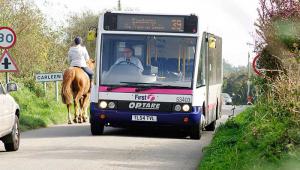A report published today by think-tank the Institute for Public Policy Research concludes that allowing local authorities in towns and rural areas to combine their efforts, to act as a franchising authority comparable to Transport for London, could halt “the downward spiral” in services outside the capital.
Last year there were more bus passenger journeys in London than in the rest of England combined, the report found, with services elsewhere in England suffering from rising fares and cuts to service support grants provided by local government.
However, report author and IPPR research fellow Luke Rakes highlighted that some parts of the country have learned lessons from London and are taking action to improve services.
As part of the government’s devolution deal with Greater Manchester, the city region’s combined authority is to take on regulatory powers over buses, while Nexus, Tyne and Wear’s passenger transport executive, is applying for the legal power to re-regulate its local bus routes. In addition, the West Yorkshire Combined Authority is also investigating bus re-regulation as part of its devolution negotiations, while last month’s agreement with Cornwall will give the county council the option to franchise bus services by 2018.
Making it easier for local authorities to form into groups would allow more areas to take on these powers, Rakes said.
The forthcoming Buses Bill, announced in the Queen’s Speech, should allow local government in towns and rural areas to form combined “Total Transport Authorities”, he said. This would allow pooling of revenue and expenditure at the scale required to take on franchising powers, and could also allow for innovations such as Oyster-style smart ticketing to be introduced.
“The lack of commercially viable bus services in towns and rural areas, combined with the cuts to local government funding for non-commercial routes, has meant a downward spiral of higher fares, lower patronage and poorer services in many areas,” Rakes added.
“London-style franchising could be an important part of the solution for many areas, but isn’t the only approach. It has worked effectively in London for 15 years and is now being adopted in Greater Manchester and possibly in Tyne and Wear, West Yorkshire and Cornwall. Its main advantage is to retain fare revenue within a locality and allow it to be used more strategically to cross-subsidise uncommercial routes. Franchising also allows greater democratic accountability over fares, services and routes, and makes network integration, multi-operator smart ticketing and data sharing more viable.
“Beyond that, authorities need to encourage and support the many innovative transport solutions – such as social enterprises and municipal companies – that have emerged over the years, and may come forward in future.”





















